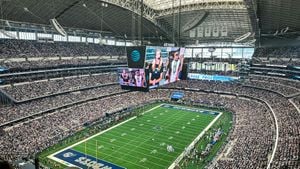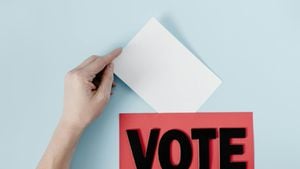The United States has made headlines by officially recognizing Edmundo González as Venezuela's president-elect, following the tumultuous presidential election held on July 28. This marks the first time the U.S. has granted González this title, signaling a significant shift in Washington's stance toward the Venezuelan political crisis. Secretary of State Antony Blinken announced the recognition with emphatic clarity, pointing to the will of the Venezuelan people: "Democracy demands respect for the will of the voters," he asserted on social media, directly addressing the accusations of electoral fraud surrounding the Maduro regime.
This decision arrives just weeks before Nicolás Maduro’s new term is set to commence on January 10, adding urgency and political tension to the forthcoming inauguration of President-elect Donald Trump on January 20. Blinken emphasized the U.S. commitment to honoring the Venezuelan vote, remarking, "The Venezuelan people spoke resoundingly on July 28 and made Edmundo González the president-elect." This acknowledgment reflects long-standing frustrations over the Maduro administration's electoral legitimacy.
Intriguingly, González expressed his gratitude shortly after the U.S. declaration. He tweeted, "This gesture honors the desire for change of our people and the civic gesture we carried out together on July 28." His response highlights the exiled leader's hope for international support amid domestic challenges.
The backdrop to this political drama includes accusations of fraudulent practices by Maduro's government during the election. Before González's recognition, Maduro had been declared the winner by Venezuela's National Electoral Council (CNE), yet he faced mounting criticism for failing to publish vote tallies. The opposition coalition, Plataforma Unitaria Democrática (PUD), published results showing González had received over double the votes of Maduro, underscoring the disparity between the official narrative and the claims of many Venezuelans.
It's worth noting the broader reaction from the Venezuelan government, particularly from Foreign Minister Yvan Gil, who denounced Blinken’s statements, labeling them as "ridiculous" and referencing Washington’s earlier support for opposition leader Juan Guaido, who was deemed interim president back in 2019. Gil's remarks included the disdainful observation, “once you are ridiculous, you never stop being ridiculous,” emphasizing the strained relations between Caracas and Washington.
Providing additional layers to this complex geopolitical narrative is the human element of the story. González has been living in exile in Spain since September, following his denunciation of government-led persecution. An arrest warrant had been issued against him, prompting significant concern for his safety. Meanwhile, fellow opposition leader María Corina Machado remains hidden, underscoring the dire situation for many political figures opposing the Maduro regime.
The international community has largely rejected Maduro's claims of victory, leading to significant protests throughout Venezuela. Following the elections, accusations of repression surfaced, with reports of 28 deaths, nearly 200 injuries, and approximately 2,400 arrests among demonstrators, including instances where individuals were imprisoned for protesting the government's actions.
Anticipation grows as the political scenario develops. Both the Biden administration and González's supporters are faced with uncertain outcomes. González himself aims to return to Venezuela when the new presidential term begins, indicating his readiness to reclaim some semblance of power. All of this is happening under the shadow of Trump's incoming administration, which is expected to adopt more stringent measures against the Maduro government.
Loremaster Marco Rubio, the Florida senator who has been proposed as Secretary of State, is known for his hardline stance on Latin American issues, particularly concerning Venezuela. Rubio previously expressed skepticism about the Biden administration's sanctions relief aimed at facilitating fair elections, criticizing it as merely empowering the Maduro regime.
González’s election bid has been contrasted with the backdrop of Venezuela's continued economic collapse, marked by widespread shortages of food, medicine, and basic goods. Venezuela’s economy has deteriorated significantly, with Maduro’s policies and the structural challenges of governance under increased scrutiny following the election. Moving forward, it remains unclear how these dynamics will play out, especially as the political conflict reaches fever pitch.
The recognition of Edmundo González as Venezuela's president-elect symbolizes not just U.S. intervention but reflects broader geopolitical rifts within Latin America, calling to attention the challenges faced by those seeking change. With international observers keeping close tabs on developments, the coming weeks will likely shape the future of both Venezuela and U.S. foreign policy.



